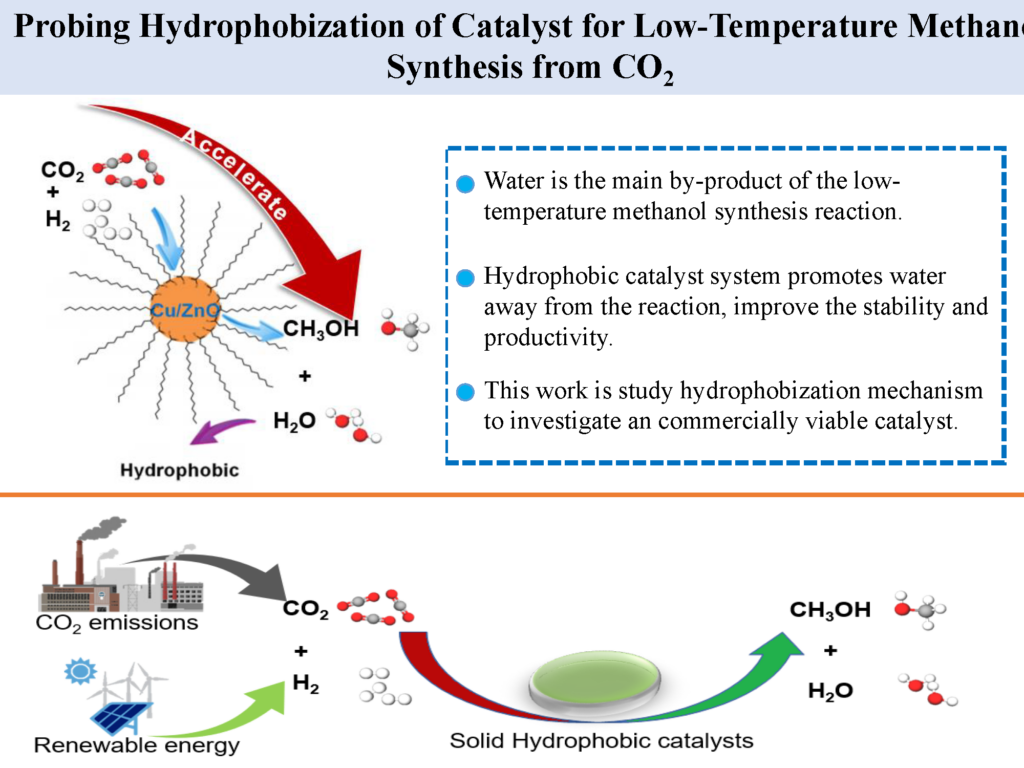自己紹介・研究目的
令和6年度 支援終了学生修了/ ■SPRING事業 採択学生紹介

ナノ新機能物質科学専攻
令和6年度 支援終了学生 大学院入学
王 帆
ワン ファン
Probing Hydrophobization of Catalyst for Low-Temperature Methanol Synthesis from CO2
Probing Hydrophobization of Catalyst for Low-Temperature Methanol Synthesis from CO2
Hello everyone, my name is Wang Fan. I am a first-year Ph.D. student in Material Systems Engineering and Life Science from Tsubaki Lab. I work on many research fields concerning Catalysis, Environment, Clean fuel and Energy, especially involved greenhouse-gas emissions, and propose to develop catalytic hydrogenation technologies to convert CO2 to methanol utilizing the hydrogen from renewable energy resources.
The purpose of my research is to develop the hydrophobic properties of catalysts in order to convert carbon dioxide (CO2) to methanol more efficiently. In recent years, emission of CO2 and its detrimental effects on climate, as one of the principal constituents of greenhouse gases, resulting in global warming have raised alarming concerns, although current efforts have been invested in exploring different techniques and approaches to reduce CO2 emission, but for industry especially generate high heat and high consumption reaction, such as the methanol manufacture, reducing carbon dioxide emissions is a still huge challenge. For methanol synthesis reactions through CO2 hydrogenation, water is the primary oxygen-containing byproduct. The produced water can be adsorbed on the active site, and thus, it alters the catalyst activity and product selectivity, water may also lead to the leaching and oxidation of metal of the methanol synthesis catalyst, thereby accelerating the deactivation of catalyst. Therefore, the hydrophobization of the catalyst will be a promising strategy in industry. However, current hydrophobization methods mainly focus on the modification of the catalyst support or coating, which often involve environmentally hazardous materials or are high economically demanding. Moreover, due to the complexity of structure and surface property, the effects of hydrophobization on the surface property and catalytic performance of metal oxide catalysts deserve rigorous characterization and investigation. This research help build a catalyst hydrophobic system to reduce carbon dioxide emissions by capture and then transformation into useful chemicals and fuels to liberate mankind from traditional fossil fuel sources.(旧フェローシップ事業採択学生)
Hello everyone, my name is Wang Fan. I am a first-year Ph.D. student in Material Systems Engineering and Life Science from Tsubaki Lab. I work on many research fields concerning Catalysis, Environment, Clean fuel and Energy, especially involved greenhouse-gas emissions, and propose to develop catalytic hydrogenation technologies to convert CO2 to methanol utilizing the hydrogen from renewable energy resources.
The purpose of my research is to develop the hydrophobic properties of catalysts in order to convert carbon dioxide (CO2) to methanol more efficiently. In recent years, emission of CO2 and its detrimental effects on climate, as one of the principal constituents of greenhouse gases, resulting in global warming have raised alarming concerns, although current efforts have been invested in exploring different techniques and approaches to reduce CO2 emission, but for industry especially generate high heat and high consumption reaction, such as the methanol manufacture, reducing carbon dioxide emissions is a still huge challenge. For methanol synthesis reactions through CO2 hydrogenation, water is the primary oxygen-containing byproduct. The produced water can be adsorbed on the active site, and thus, it alters the catalyst activity and product selectivity, water may also lead to the leaching and oxidation of metal of the methanol synthesis catalyst, thereby accelerating the deactivation of catalyst. Therefore, the hydrophobization of the catalyst will be a promising strategy in industry. However, current hydrophobization methods mainly focus on the modification of the catalyst support or coating, which often involve environmentally hazardous materials or are high economically demanding. Moreover, due to the complexity of structure and surface property, the effects of hydrophobization on the surface property and catalytic performance of metal oxide catalysts deserve rigorous characterization and investigation. This research help build a catalyst hydrophobic system to reduce carbon dioxide emissions by capture and then transformation into useful chemicals and fuels to liberate mankind from traditional fossil fuel sources.(旧フェローシップ事業採択学生)


